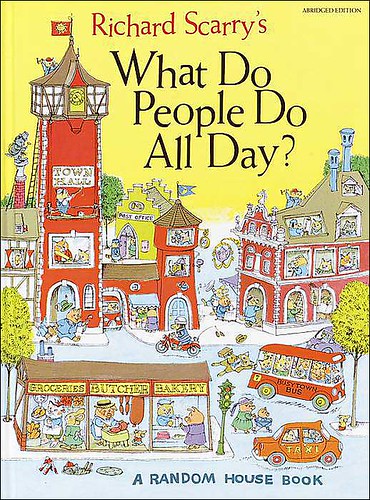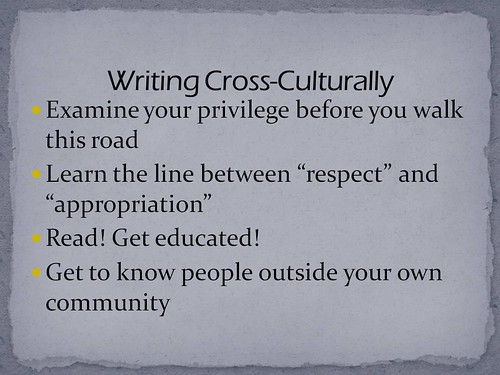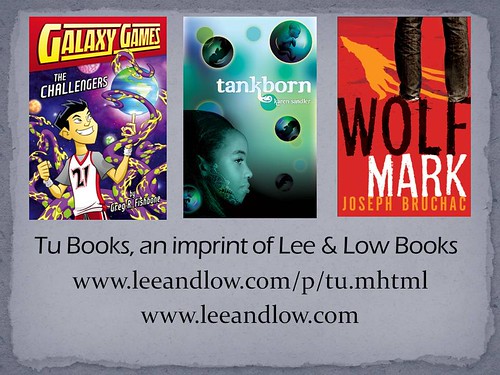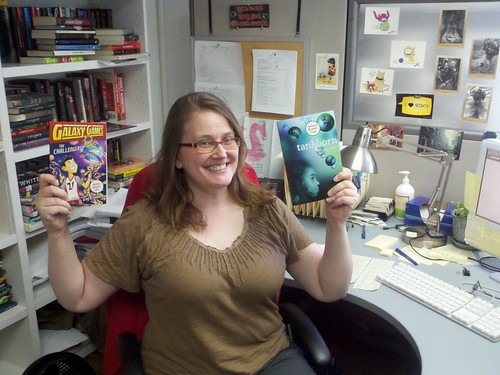 I recently lamented that I had little blog fodder anymore—and of course I know you are all languishing to know what has been happening in my brain lately—and a friend suggested that I talk about the editorial process, because she didn’t know much about it. I have discussed it on this blog before, but my tag system isn’t the most organized filing system so perhaps it’s time to revisit the subject.
I recently lamented that I had little blog fodder anymore—and of course I know you are all languishing to know what has been happening in my brain lately—and a friend suggested that I talk about the editorial process, because she didn’t know much about it. I have discussed it on this blog before, but my tag system isn’t the most organized filing system so perhaps it’s time to revisit the subject.
This idea was reemphasized to me the other day when I got an email asking me (paraphrased and anonymized):
How would I go about getting a job like yours? I don’t have the discipline to write every day. I would love a job where I could read books all the time. Is there a way to become an editor instead of a writer without having to go back to full time education?
I like to joke that I get to read for a living, but the reality is that reading manuscript submissions is only a small part of my job, one that I constantly feel like I don’t have enough time to do. So here’s just a little window into the kinds of tasks I’ve been doing over the course of the last few weeks as I prepared and sent three books out to the printer for advance reader’s copies (and a few things I’ll be doing later this week). Some of these tasks only took a few minutes, some an hour, some took all day or several days, in the case of editing a manuscript.
- Meet with company vice president to go over a new-to-me procedure (in this case, several times, as this is our first season; this includes meetings about how to coordinate with the production manager, how to upload files to the printer’s FTP site, how to double check the files I received from the designers to ensure that what I’m sending to the printer has the correct measurements including bleeds, etc.)
- Check with marketing to ensure that the number of ARCs I’m telling the production manager we need is still correct
- Assemble all the specs of the ARCs to go along with the files I’m sending to the printer
- Compress PDFs for uploading to the printer
- Transfer zipped files to the printer’s site
- Organize feedback for partial revision that I’m asking author for to prepare for acquisition meeting
- Back-and-forth with author, including reading revision and clarifying some points
- Organize more feedback to refine partial revision for acquisition meeting
- Put together two acquisitions memos for the acquisition meeting, including market research, editorial notes, comparison titles, etc., and a trip to the library to find a particular book to show around at the meeting
- Go to acquisition committee meeting, present on why we need/want the books in consideration
- Email several agents about books in various stages of consideration
- Prepare offers for books discussed in acquisitions
- Negotiate with agents
- Prepare fall preview (visuals from my fall books) for department quarterly meeting
- Attend department quarterly meeting, talk about fall books briefly
- Attend company quarterly meeting, talk about fall books briefly
- Read full manuscripts that have been waiting too long for a reply (ongoing)
- Make a decision on whether to send feedback on certain full manuscripts
- Organize notes for manuscripts that I’m sending feedback on (ongoing, as I am working on several at once)
- Give partial submissions to intern to sort through and give feedback on to assist me in separating out the most promising submissions (ongoing)—which results in a pile of promising submissions I need to go through
- Request full manuscripts of most promising submissions
- Look at huge submissions pile and feel guilty that I’m not faster (multiple times a day)
- Look at most recent version of cover for all three fall books, proofread, send feedback and design requests to designers
- Go through interior galleys of three ARCs to ensure that copyedit/proofreading changes have been made
- Send interior galley revision requests to designer
- Start the edit for a spring book (this in-depth edit is a second look after a revision, so it won’t take quite as long as the first, but it has already taken several full days and will probably take two or three more before it’s done)
- Start the search for a cultural expert for a spring book
- Prepare bar codes to send to designers for final fall covers
- Meet with a group of college students to tell them about how I started the imprint and why diversity in children’s fantasy and science fiction is important
- Talk with marketing about a new thing we’re thinking of doing for our fall books
- Look at Tu’s catalog page to ensure it’s the most up-to-date information before the catalog goes out the door
- Actually upload fall books to printer’s site, coordinate with production manager
I feel like I’m missing something, and the list is very much out of order compared to the way the last few weeks went, but it gives you an idea. And looking at that list, no wonder I’ve been so tired these last few weeks! But my point is, there is so much that an editor does. Some of these things, like coordinating directly with a designer, are something that an editor might not do at a larger house because they have People for that. I like being able to coordinate the stages of my books so closely, though of course things like submitting my own Cataloging-in-Publication data are less interesting than being involved in the design of a book or choosing the paper.
Qualifications
Does someone need to be qualified to be an editor beyond a love of reading? If you already have a bachelor’s degree, I’m not sure it’s necessary to go back to school for an English degree (my undergrad is in marriage, family, and human development, with an emphasis on child development), but a love of reading certainly isn’t enough. More important than that, a good editor needs critical reading skills, the ability to sift out the most promising submissions—both in artistic quality and in marketability. A good editor, therefore, also needs to understand the market that he or she wants to work in, and in this changing climate, an innovative business-oriented mind is an important asset (this can be learned, believe me—I never really thought of myself as a “business” type). A good editor needs a deep understanding of the audience for the books she wants to edit, particularly when it comes to children’s and young adult books, because of the developmental needs of the audience that sometimes adults forget about—and the ability to recognize and sift out condescension to that audience.
A good editor needs the ability to work independently and as a team, depending on the task at hand, and the ability to be organized in keeping track of long-term projects (most books take at least a year if not more from acquisition to publication). A good editor doesn’t necessarily have to be a fast reader (though it helps if you’re editing the number of books some of my colleagues do a year—some editors work on 20, 30, or 40 books per year; they’re generally at houses where they don’t have a direct hand in every other stage of the process, though, and many of them have full-time assistants to sort through the slush pile, if their house even still allows slush). What an editor does need as far as reading skills, however, is a sharp eye for detail when necessary, and the ability to also hold a picture of the full scope of a long book in their mind at the same time, in addition to a great sense of taste for voice, and the ability to help shape prose that needs it, including a strong knowledge of grammar but also a good sense of what is missing—how to guide a writer in filling in the gaps in a manuscript with promise. That means being able to see characterization flaws, plot holes, pacing problems, and worldbuilding weaknesses, and know ways to suggest fixing them.
And all of that requires enough people skills to know how to communicate these ideas to writers with diplomacy, tact, and in a way that works for the writer’s particular personality. Hopefully you have a bachelor’s—and it doesn’t need to be in English. The next step, after ensuring you have all these qualities, is to get job experience, and that means being willing to start at the bottom (internships, editorial assistant positions) and work your way up, learning from a mentoring system, basically, as you go.
The editing process
So, let’s talk about the editing process for the life of one book. After I’ve requested the full manuscript and like it enough to decide to work with it, I start out with developmental editing, usually even before a book is acquired. I’ll read requested full manuscripts through, trying to take as few notes as possible because notes just slow me down. I’m just trying to get a feel for whether the voice, plotting, and characterization suck me in enough to want to work on this project for over a year of my life, not get hung up on typos, even if the author can’t spell “all right.” (Note: NOT “alright.”) Those that I decide are strong enough that I might want to take to acquisitions, I then evaluate whether they’re strong enough to discuss right away, or if they might need a little development.
Then, if it needs work (and most projects usually need at least a little work), I’ll make notes of the most important things that need addressing, the things that I couldn’t bring the book to acquisitions without addressing. Sometimes that’s a weak beginning. Sometimes it’s a character who doesn’t feel like he or she is working. Sometimes it’s strengthening worldbuilding, or a critical change needed in the main character that would be a dealbreaker otherwise. It might be a need to delete some scenes, or add some scenes, or for pacing to be adjusted, or any number of other fairly big-picture adjustments. But the book is strong enough for some reason (usually the voice and an original concept) that these things are worth asking for.
Then I talk with the author (or sometimes with the agent) and ask if she or he would be willing to make the changes I ask for, usually by compiling those notes into an editorial letter, but sometimes in a more casual email. Usually they’re willing to do at least a partial revision to make sure that the book is seen in its best light—if I’m serious enough about a book to ask for a revision, it’s something I hope to eventually take to acquisitions.
If the revision is done to my satisfaction, I’ll take the book to acquisitions and we’ll talk about how it fits our list, what need it fills, market viability, and so forth. We’ll make a decision on whether we want to make an offer.
Then the negotiation process begins, either with the author directly or with their agent, if they have one. Contracts get negotiated and signed, etc.
After that (well, during the contract negotiations, really), the author and I set up deadlines for milestone revisions—usually the first revision date and the final due date, though we might expect that some intermediate revisions could crop up. The revision at the first revision stage is often still developmental, focusing on the big picture. It might be finishing a revision that was begun with a partial, or it might be another full developmental round.
After developmental editing needs are satisfied, we move on to line editing, refining the words on the page at the paragraph and sentence level. This is often accompanied by further smaller developmental tweaks, usually artifacts left over from bigger changes.
Once the author has completed any line editing changes necessary, then it’s on to copyediting, which is usually done by another editor, often a freelancer who specializes in catching the grammatical details that we weren’t looking for in the previous passes. That could be as easy as looking for typos and punctuation errors, but usually it’s more in-depth, covering part fact-checking (“are you sure there’s an “East Side” of Chicago?”), part continuity police (“He had green eyes on page 15 and brown eyes on page 278. Which is it?”), part general secondary reader (querying a point that’s confusing, or querying a change in wording that might clarify or correct an error), and most importantly, the copyeditor is the person who catches the vagaries of usage that we never really think about in speech, such as dangling modifiers, unclear antecedents, the difference between hyphens and em-dashes, and all those other grammar-nerd things that a lot of people think is an acquisition editor’s only duty.
Then once the editor and author go over copyedits, accepting and rejecting changes and discussing any points in conflict, it’s on to proofreading to catch the little stuff. Often by the time we’re at proofreading the book has been designed and the text has been flowed into the galleys, so in addition to typos and random little problems like that, the proofreader might also look for bad breaks (in children’s books it’s not really a good idea to break any words across the page or to break hard words at all), stacks (the same word starting or ending multiple lines), missing or extraneous page elements (such as headers on a chapter opener page, missing page numbers), that kind of thing.
And while all this is going back and forth between the editor, copyeditor, proofreader, and author—multiple times per editor and all at various stages, because of course no editor ever works on only one book at a time—remember that long list of things I’ve done in the last few weeks? There are about that many other things going on at the same time at any given moment in the book’s life cycle.
What do editors do all day? Not reading, in the sense of reading only submissions (though at any given moment we might be reading as we edit). The only time an editor really has that luxury is when first starting a new job, when the work hasn’t started to pile up. I had this luxury back in early 2010 when I was starting Tu because I also didn’t inherit any books from a previous editor—because I was starting a brand-new imprint—so I was reading submissions all day, every day, until I found books I wanted to push forward to the next stage. Then it gets complicated, and you have to budget your time and make yourself a schedule of deadlines to ensure that you’re keeping up with all the myriad things that need to be done. For example, I’m coming up on a deadline to order art for one of my spring books, which tells me that I need to start talking to the author and the designer and putting together ideas so all the design and art needs this book will need will have plenty of time.
One editor friend described all these little things that editors need to do as “being nibbled to death by ducks.” What do you think—appropriate?





